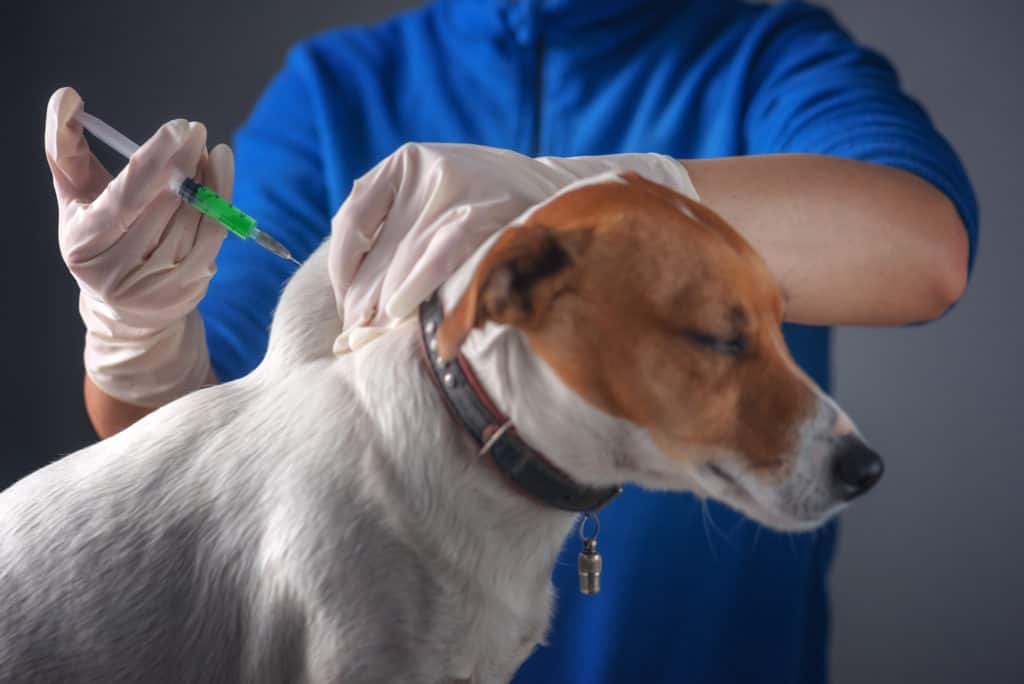Ideally, most puppies need a minimum of 3 sets of shots during their first year of life. However, in some cases, your puppy’s vet may recommend a 4th set of vaccinations for various reasons, which will help in boosting your dog’s immunity against diseases.
The topic of puppies’ vaccinations is always a tricky one, leaving a lot of dog owners confused about what’s best for their little puppers. So, do puppies need 3 or 4 sets of shots?

How Many Rounds of Shots Do Puppies Need?
In most cases, all puppies are recommended 3 sets of shots that are administered in the first few months of the dog’s life.
In some cases, your puppy may require a 4th or even a 5th round of vaccine shots in order to maximize the immunity against certain diseases, especially if they’re at an above average risk of that disease.
In other words, 3 sets of shots are the default for all puppies, but 4 and 5 sets are abnormal and the vet will usually explain why your dog needs it.
Helpful Dog Health Resource:
Note: Our Health is #1 Priority. It should be no different for your dog. But you need to help him. The Ultimate Guide to Dog Health is the answer. This handy guide will help you recognize the symptoms of the health problems above. Get the knowledge to stay ahead of these terrible issues that can rob your lovely dog from vigor and life. Help your friend make it to 14 yrs+ without pain and suffering.
Which Shots Do Your Puppies Need?
There are many vaccines that are available for puppies and are recommended by the vet depending on various factors that we’ll discuss below.
However, there are “core vaccines” that are always recommended for all puppies, even indoor ones. This vaccine set is known as “DHLPP+R”, which includes:
- Distemper
- Hepatitis
- Leptospirosis
- Parvo
- Parainfluenza
- Rabies
Additionally, there are also some optional vaccines that are recommended depending on risk factors, which are known as “non-core vaccines”.
These vaccines are typically recommended by your vet and will be introduced in various stages among vaccine sets. These include:
- Bordetella “Kennel Cough”
- Influenza
- Lyme disease, which is caused by ticks.
- Coronavirus (causes gastrointestinal problems – not to be confused with Covid 19)
When Should You Vaccinate Your Dog?

The schedule of vaccination will vary from one dog to another. However, there's a general schedule that shows you when different vaccines are introduced to your puppy according to its age in weeks:
Week 6 to 8
The first set of shots typically includes Distemper and Parvo vaccines, which are considered core vaccines.
The vet may also recommend a Bordetella vaccine, depending on the lifestyle and risk factors of your puppy.
Week 9 to 12
In the second set, your puppy should be administered the following vaccines:
- DHPP (also known as D2AP), which is a combination of Distemper, Hepatitis (Adenovirus), Parvovirus, and Parainfluenza (essential)
- Influenza (optional)
- Leptospirosis (optional)
- Bordetella (optional)
- Lyme (optional)
Week 12 to 16
The third set is given at least 3 months apart from the second, and should contain the following vaccines:
- DHPP or D2AP (essential)
- Rabies (essential – administered and repeated depending on state regulations)
- Leptospirosis (essential)
- Bordetella (optional)
- Influenza (optional)
- Lyme (optional)
Week 18 to 20
Not all puppies will require a 4th shot. However, if your dog needs it, it’s usually similar to the previous round of shots with the addition of an optional Coronavirus shot.
Factors That Affect the Sets of Shot Puppies Need
One thing you should know about puppy vaccination is that various factors will play a role in the timing and number of shot sets in addition to which vaccines are included in every round.
As a reason, every puppy’s situation is different, so you should always consult your puppy’s vet, to get the right sets of vaccines for your pup.
Here’s a quick look at some of the factors that you need to consider when vaccinating your puppy:
- The puppy’s breed
- Any specific risk factors associated with the puppy
- Whether the puppy was well nourished and nursed in its early weeks
- The general health of the parents and whether they were vaccinated
- Whether the puppy previously tested positive for a specific infection
- The number of puppies in the same litter
- The conditions where they were born and raised
- The dog’s expected purpose and the kind of environment they’re expected to be in (family dog, service dog, hunting dog, companion dog, etc.)

How Do Puppy Vaccines Work?
You might be wondering whether vaccine shots are necessary for your puppy, so here’s how they work, which will also explain their importance for your little doggo!
Puppies are born with a relatively weak immune system. While nursing, some of the mother’s antibodies are transferred to their puppies in order to nourish and strengthen their immune system. These are known as “maternal antibodies”.
Since these antibodies are not created by the puppy’s body, most of them will eventually fade away when the puppy passes the nursing stage, leaving the dog’s immune system at risk again.
That’s where vaccines hop in for the rescue. These shots contain weakened or dead substrates of viruses and bacteria that are enough to trigger an immune response.
This response will stimulate the puppy’s body to produce its own antibodies, improving the puppy’s general immunity to certain diseases.
Helpful Dog Training Resource:
For help with training your dog, you should take a look at The Online Dog Trainer by Doggy Dan. Doggy Dan is an expert Dog Trainer based in New Zealand. His online resource contains Hundreds of Excellent Dog Training Videos that will take you step-by-step through the process of developing a healthy, happy well-behaved dog.
How Much Should Puppy Shots Cost?
The total costs of puppy vaccine shots will vary depending on various aspects, such as:
- The number of sets your puppy needed
- Where the shots are administered to your puppy
- The rates in your region
- Whether you’ve included any specific vaccines
- Whether your pet insurance policy covers vaccination bills partially, fully, or none at all
With that said, we should still have a rough estimation of the total costs of vaccines based on the rates nationwide.
Ideally, you should expect all 3 sets of shots administered to cost you a total of around 100 USD to 120 USD. On the other hand, a 4 set vaccination will cost slightly higher at around 130 USD to 150 USD.
At such a price, your dog should get all the DHPP vaccines, which are considered core vaccines, in addition to an initial rabies vaccine that would last for one year.
The price of the rabies vaccine is either included in the core vaccine or is charged separately, depending on the policy of the clinic.
You should also keep in mind that some shelters may offer the vaccines at a much lower price or even completely free of charge, especially if you’re adopting a puppy that is past the age of vaccination.

Paul has been creating content for the dog niche for many years. The information he shares comes his first hand experience growing up in dog lovers household and then owning multiple dog breeds of his own as an adult. Paul enjoys doing the hard research to collect, analyze and present our dogtemperament.com readers with the best answers to their questions.